外研版(2019) 选择性必修第一册 Unit 1 Laugh out Loud! Using language非限制性定语从句 课件 (23张ppt)
文档属性
| 名称 | 外研版(2019) 选择性必修第一册 Unit 1 Laugh out Loud! Using language非限制性定语从句 课件 (23张ppt) | 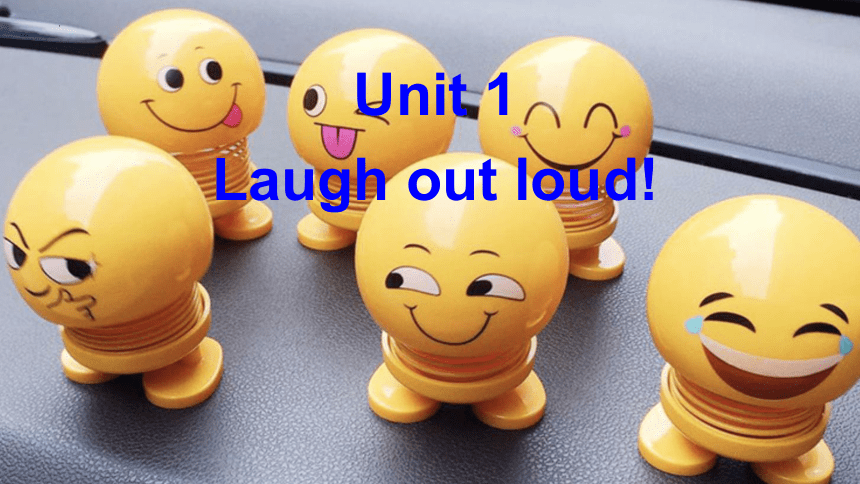 | |
| 格式 | pptx | ||
| 文件大小 | 6.3MB | ||
| 资源类型 | 教案 | ||
| 版本资源 | 外研版(2019) | ||
| 科目 | 英语 | ||
| 更新时间 | 2022-10-18 21:39:20 | ||
图片预览

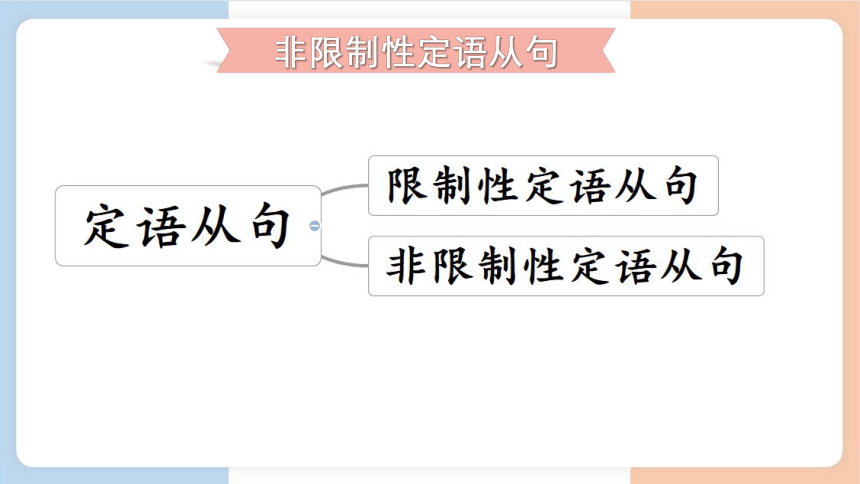
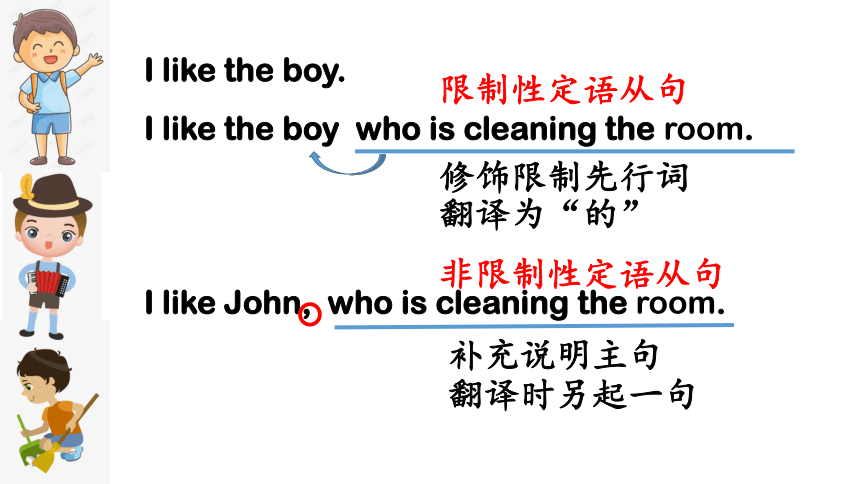
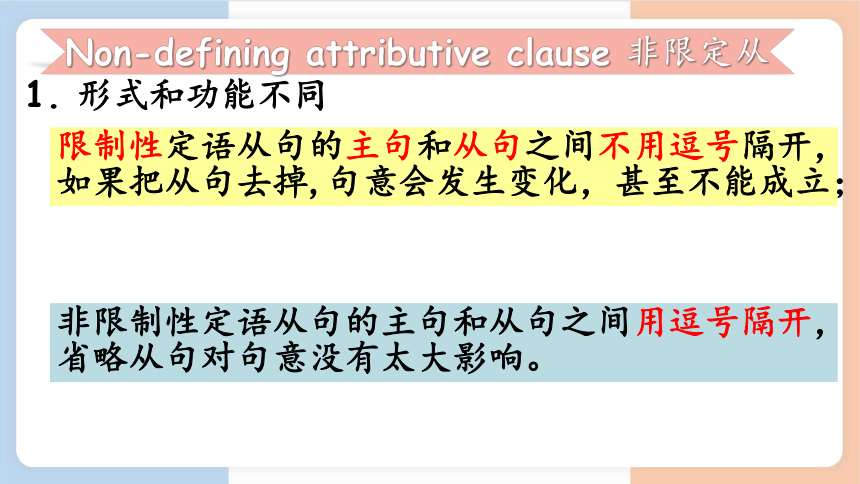
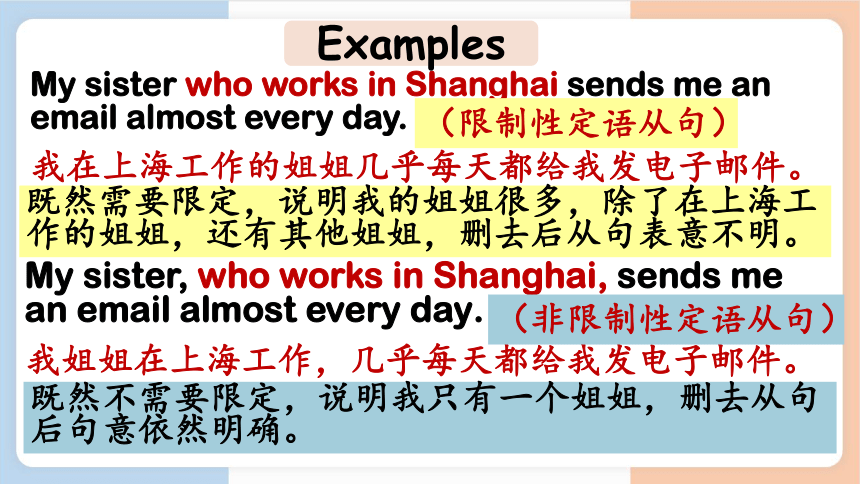
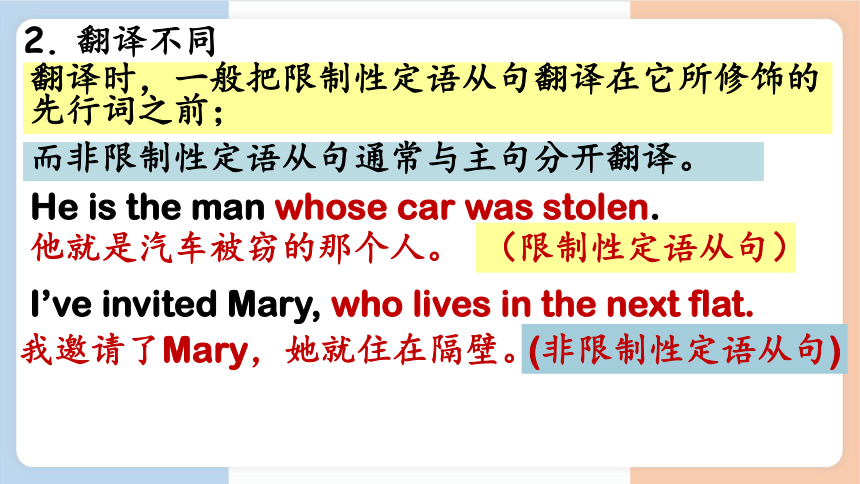
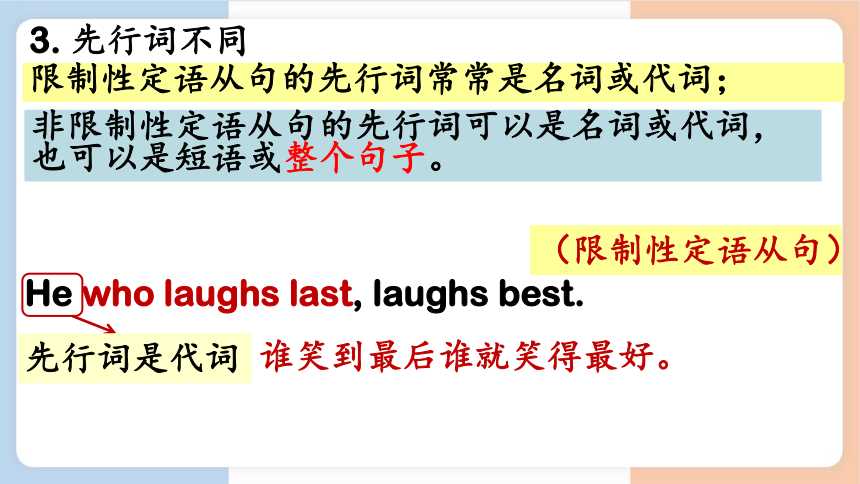
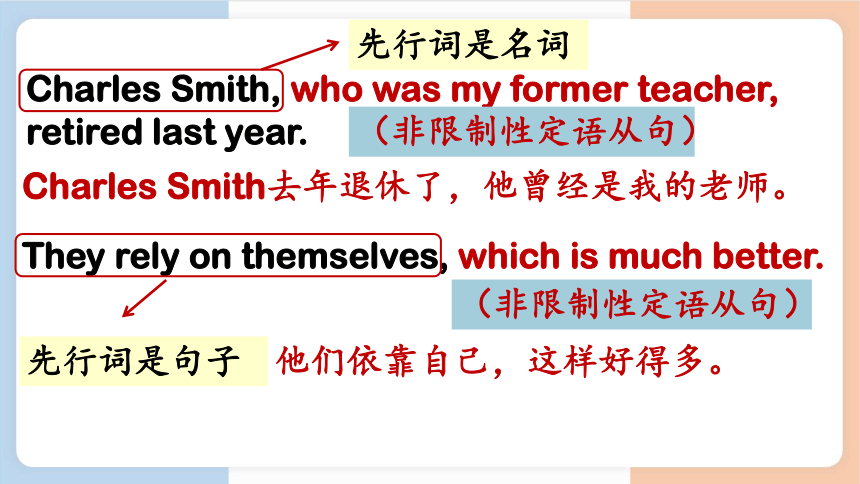
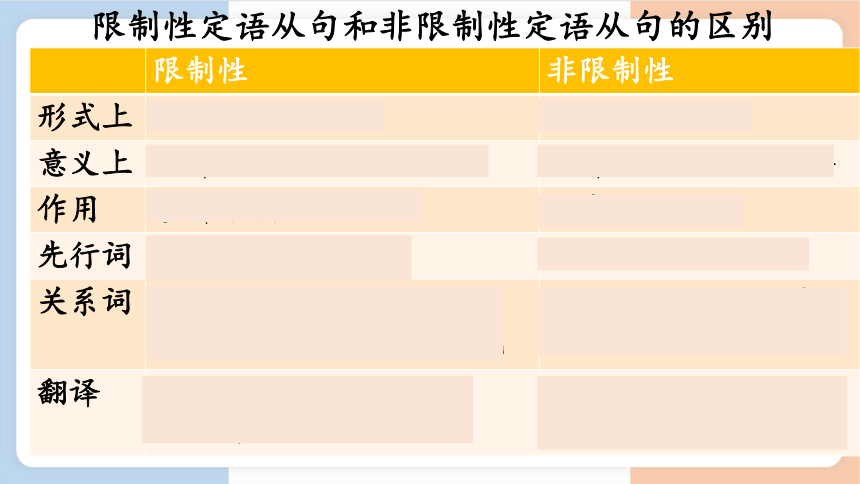
文档简介
(共23张PPT)
Unit 1
Laugh out loud!
非限制性定语从句
I like the boy.
I like the boy who is cleaning the room.
I like John, who is cleaning the room.
限制性定语从句
修饰限制先行词
翻译为“的”
非限制性定语从句
补充说明主句
翻译时另起一句
Non-defining attributive clause 非限定从
1. 形式和功能不同
限制性定语从句的主句和从句之间不用逗号隔开,如果把从句去掉,句意会发生变化,甚至不能成立;
非限制性定语从句的主句和从句之间用逗号隔开,省略从句对句意没有太大影响。
My sister who works in Shanghai sends me an email almost every day.
既然需要限定,说明我的姐姐很多,除了在上海工作的姐姐,还有其他姐姐,删去后从句表意不明。
我在上海工作的姐姐几乎每天都给我发电子邮件。
(限制性定语从句)
Examples
My sister, who works in Shanghai, sends me an email almost every day.
既然不需要限定,说明我只有一个姐姐,删去从句后句意依然明确。
我姐姐在上海工作,几乎每天都给我发电子邮件。
(非限制性定语从句)
2. 翻译不同
翻译时,一般把限制性定语从句翻译在它所修饰的先行词之前;
而非限制性定语从句通常与主句分开翻译。
He is the man whose car was stolen.
他就是汽车被窃的那个人。
(限制性定语从句)
I’ve invited Mary, who lives in the next flat.
我邀请了Mary,她就住在隔壁。
(非限制性定语从句)
3. 先行词不同
限制性定语从句的先行词常常是名词或代词;
非限制性定语从句的先行词可以是名词或代词,也可以是短语或整个句子。
He who laughs last, laughs best.
谁笑到最后谁就笑得最好。
先行词是代词
(限制性定语从句)
Charles Smith, who was my former teacher,
retired last year.
Charles Smith去年退休了,他曾经是我的老师。
(非限制性定语从句)
They rely on themselves, which is much better.
他们依靠自己,这样好得多。
(非限制性定语从句)
先行词是名词
先行词是句子
限制性定语从句和非限制性定语从句的区别
限制性 非限制性
形式上 不用逗号 用逗号
意义上 去掉后主句意思不完整 去掉后主句意思完整
作用 修饰限制 补充说明
先行词 词(n/pron)/短语 词/短语/整个主句
关系词 关代作宾时可省 whom作宾时可用who代 不用that, why引导
所有关代均不可省
翻译 先译从句再译先行词, ……的…… 先译先行词后译从句,形成两个分句
关系词
指人 指物 所属
限制性 who, whom, that which, that, as whose
非限制性 who, whom which, as whose
This is the man (whom/who/that) we are talking about.
The young man had a new girlfriend, whom he wanted to impress.
Her father, who has a lot of money, wishes her to study abroad.
(改错) I had to fix my printer, that I bought less than a year ago.
which
非限制性定语从句需要注意的问题
1.非限制性定语从句常常位于句末,但也可位于句中,
这时前后都需要用逗号隔开。
The children, who wanted to play football, were disappointed
when it rained. 那些孩子都想踢足球,(因而)因下雨感到失望。
2.“介词+关系代词”也可以引导非限制性定语从句。
先行词指人时关系代词用whom,不可用who/that;先行词指物时,关系代词用which,不能用that。
As everyone knows, China is a country with a long history.
She is a great hero, as is described in the report.
He invited me to dinner, which made me very happy.
This novel, which I have read three times, is very touching.
观察并思考:关系词as和which的区别?
归纳 3:
as和which在引导非限制性定语从句时可代替整个主句。
as和which引导非限制性定语从句时的位置不同:
as引导的定语从句可置于___________________,而which引导的非限制性定语从句不可放在_______________________________。
句首、句中、句后
句首,只能放在句中、句后
注意:
as引导非限制性定语从句时,常用于下列一些固定结构中:
a) as is expected (不出所料);b) as is mentioned above (正如上面所提到的) ;
c) as we all know/as is known to all( 众所周知) ;d) as is reported (正如所报道的) ;
e)as is often the case (这是常有的事)等。
As
3.____ everyone can see, she is always working hard.
Click on the picture to check the answer
1. is known to everybody,the moon travels around the earth
once every month.
2.English is a language shared by several diverse cultures,each of uses it differently.
3.She gave another piece of advice, I think was of great
help to the research work.
4.She showed the visitors around the museum,
construction had taken more than three years.
As
which
which
whose
Ⅰ.用适当的关系词填空
5.The number of smokers, is reported,has dropped
by 17 percent in just one year.
6.The meeting, was held in the park,was attended
by 1,000 people.
7.They came to China in the 1970s, China was not open
to the out-side world.
as
which
when
介词+关系词
In the dark street, there wasn’t a single person_________ she could turn for help.
to whom
The factory _________ his father works is
faraway from my hometown.
in which
This is Mr. Smith, _________ factory we work.
in whose
We stood at the top of the hill, ___________ we can see the town.
from where
Activity 6 (P6)
Match the expressions you have completed in the above activity to their meanings.
_______________: a person that everyone laughs at because they have done something funny or silly
_______________: to look friendly and happy, especially when other people are not expecting you to
________________: to look extremely happy because you are very pleased about something
________________: to smile slightly
________________: to laugh very loudly and for a long time
laughing stock
be all smiles
grin from ear to ear
crack a smile
laugh one’s head off
Activity 6 (P6)
Now work in groups and think of more expressions about laughter.
a good laugh
burst out laughing
fall about laughing
for laughs
have / get the last laugh
He who laughs last, laughs best.
laugh up one’s sleeve
哈哈大笑
放声大笑
忍不住大笑
为了取乐;作为消遣
笑到最后
笑到最后的人笑得最开心。
窃笑
语法填空
1. Now Irene Astbury works from 9am to 5pm daily at the pet shop in Macclesfield, ________ she opened with her late husband Les.
(2019全国卷II)
2. They were well trained by their masters ______ had great experience with caring for these animals.
(2019全国卷III)
which
who
3. On the edge of the jacket, there is a piece of cloth __________ gives off light in the dark.
(2019浙江高考)
4. The 80,000 objects collected by Sir Hans Sloane, for example, formed the core collection of the British Museum ___________ opened in 1759.
(2020全国新高考I卷)
that/which
that/which
5. Many lessons are now available online, from _____ students can choose for free.
(2020江苏卷)
A. whose B. which C. when D. whom
6. In ancient China lived an artist ________ paintings were almost lifelike.
(2020全国卷III)
whose
7. Thank you for your letter, what really made me happy.
(2020全国卷II 短文改错)
8. Understanding her good intentions, I eat all the food what is provided by Mom with appreciation.
(2020全国卷III 短文改错)
which
that
Unit 1
Laugh out loud!
非限制性定语从句
I like the boy.
I like the boy who is cleaning the room.
I like John, who is cleaning the room.
限制性定语从句
修饰限制先行词
翻译为“的”
非限制性定语从句
补充说明主句
翻译时另起一句
Non-defining attributive clause 非限定从
1. 形式和功能不同
限制性定语从句的主句和从句之间不用逗号隔开,如果把从句去掉,句意会发生变化,甚至不能成立;
非限制性定语从句的主句和从句之间用逗号隔开,省略从句对句意没有太大影响。
My sister who works in Shanghai sends me an email almost every day.
既然需要限定,说明我的姐姐很多,除了在上海工作的姐姐,还有其他姐姐,删去后从句表意不明。
我在上海工作的姐姐几乎每天都给我发电子邮件。
(限制性定语从句)
Examples
My sister, who works in Shanghai, sends me an email almost every day.
既然不需要限定,说明我只有一个姐姐,删去从句后句意依然明确。
我姐姐在上海工作,几乎每天都给我发电子邮件。
(非限制性定语从句)
2. 翻译不同
翻译时,一般把限制性定语从句翻译在它所修饰的先行词之前;
而非限制性定语从句通常与主句分开翻译。
He is the man whose car was stolen.
他就是汽车被窃的那个人。
(限制性定语从句)
I’ve invited Mary, who lives in the next flat.
我邀请了Mary,她就住在隔壁。
(非限制性定语从句)
3. 先行词不同
限制性定语从句的先行词常常是名词或代词;
非限制性定语从句的先行词可以是名词或代词,也可以是短语或整个句子。
He who laughs last, laughs best.
谁笑到最后谁就笑得最好。
先行词是代词
(限制性定语从句)
Charles Smith, who was my former teacher,
retired last year.
Charles Smith去年退休了,他曾经是我的老师。
(非限制性定语从句)
They rely on themselves, which is much better.
他们依靠自己,这样好得多。
(非限制性定语从句)
先行词是名词
先行词是句子
限制性定语从句和非限制性定语从句的区别
限制性 非限制性
形式上 不用逗号 用逗号
意义上 去掉后主句意思不完整 去掉后主句意思完整
作用 修饰限制 补充说明
先行词 词(n/pron)/短语 词/短语/整个主句
关系词 关代作宾时可省 whom作宾时可用who代 不用that, why引导
所有关代均不可省
翻译 先译从句再译先行词, ……的…… 先译先行词后译从句,形成两个分句
关系词
指人 指物 所属
限制性 who, whom, that which, that, as whose
非限制性 who, whom which, as whose
This is the man (whom/who/that) we are talking about.
The young man had a new girlfriend, whom he wanted to impress.
Her father, who has a lot of money, wishes her to study abroad.
(改错) I had to fix my printer, that I bought less than a year ago.
which
非限制性定语从句需要注意的问题
1.非限制性定语从句常常位于句末,但也可位于句中,
这时前后都需要用逗号隔开。
The children, who wanted to play football, were disappointed
when it rained. 那些孩子都想踢足球,(因而)因下雨感到失望。
2.“介词+关系代词”也可以引导非限制性定语从句。
先行词指人时关系代词用whom,不可用who/that;先行词指物时,关系代词用which,不能用that。
As everyone knows, China is a country with a long history.
She is a great hero, as is described in the report.
He invited me to dinner, which made me very happy.
This novel, which I have read three times, is very touching.
观察并思考:关系词as和which的区别?
归纳 3:
as和which在引导非限制性定语从句时可代替整个主句。
as和which引导非限制性定语从句时的位置不同:
as引导的定语从句可置于___________________,而which引导的非限制性定语从句不可放在_______________________________。
句首、句中、句后
句首,只能放在句中、句后
注意:
as引导非限制性定语从句时,常用于下列一些固定结构中:
a) as is expected (不出所料);b) as is mentioned above (正如上面所提到的) ;
c) as we all know/as is known to all( 众所周知) ;d) as is reported (正如所报道的) ;
e)as is often the case (这是常有的事)等。
As
3.____ everyone can see, she is always working hard.
Click on the picture to check the answer
1. is known to everybody,the moon travels around the earth
once every month.
2.English is a language shared by several diverse cultures,each of uses it differently.
3.She gave another piece of advice, I think was of great
help to the research work.
4.She showed the visitors around the museum,
construction had taken more than three years.
As
which
which
whose
Ⅰ.用适当的关系词填空
5.The number of smokers, is reported,has dropped
by 17 percent in just one year.
6.The meeting, was held in the park,was attended
by 1,000 people.
7.They came to China in the 1970s, China was not open
to the out-side world.
as
which
when
介词+关系词
In the dark street, there wasn’t a single person_________ she could turn for help.
to whom
The factory _________ his father works is
faraway from my hometown.
in which
This is Mr. Smith, _________ factory we work.
in whose
We stood at the top of the hill, ___________ we can see the town.
from where
Activity 6 (P6)
Match the expressions you have completed in the above activity to their meanings.
_______________: a person that everyone laughs at because they have done something funny or silly
_______________: to look friendly and happy, especially when other people are not expecting you to
________________: to look extremely happy because you are very pleased about something
________________: to smile slightly
________________: to laugh very loudly and for a long time
laughing stock
be all smiles
grin from ear to ear
crack a smile
laugh one’s head off
Activity 6 (P6)
Now work in groups and think of more expressions about laughter.
a good laugh
burst out laughing
fall about laughing
for laughs
have / get the last laugh
He who laughs last, laughs best.
laugh up one’s sleeve
哈哈大笑
放声大笑
忍不住大笑
为了取乐;作为消遣
笑到最后
笑到最后的人笑得最开心。
窃笑
语法填空
1. Now Irene Astbury works from 9am to 5pm daily at the pet shop in Macclesfield, ________ she opened with her late husband Les.
(2019全国卷II)
2. They were well trained by their masters ______ had great experience with caring for these animals.
(2019全国卷III)
which
who
3. On the edge of the jacket, there is a piece of cloth __________ gives off light in the dark.
(2019浙江高考)
4. The 80,000 objects collected by Sir Hans Sloane, for example, formed the core collection of the British Museum ___________ opened in 1759.
(2020全国新高考I卷)
that/which
that/which
5. Many lessons are now available online, from _____ students can choose for free.
(2020江苏卷)
A. whose B. which C. when D. whom
6. In ancient China lived an artist ________ paintings were almost lifelike.
(2020全国卷III)
whose
7. Thank you for your letter, what really made me happy.
(2020全国卷II 短文改错)
8. Understanding her good intentions, I eat all the food what is provided by Mom with appreciation.
(2020全国卷III 短文改错)
which
that
